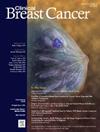Effects of AKT Inhibitors for PIK3CA/AKT1/PTEN-Altered Advanced or Metastatic Breast Cancer: A Meta-Analysis of Randomized Clinical Trials
IF 2.9
3区 医学
Q2 ONCOLOGY
引用次数: 0
Abstract
Purpose
We aimed to answer the following question: How effective is the addition of AKT inhibitors to the treatment of advanced or metastatic breast cancer?
Methods
We searched PubMed, Embase and Cochrane for randomized controlled trials (RCTs) that investigated AKT inhibitors for advanced or metastatic BC. We computed hazard-ratios (HRs) for binary endpoints.
Results
A total of 5 RCTs were included in the meta-analysis, comprising 1,334 patients with BC. The use of AKT inhibitors demonstrated a significant improvement in OS (HR 0.70; 95% CI, 0.58-0.85; P < .001) and PFS (HR 0.6797; 95% CI, 0.5499-0.8403; P < .001) in the overall population. Within the PIK3CA/AKT1/PTEN-altered subgroup (n = 645), the OS rate also significantly favored AKT inhibitors over the control group (HR 0.62; 95% CI, 0.42-0.92; P = .019), as well as PFS (HR 0.5224; 95% CI, 0.3366-0.8105; P = .004).
Conclusions
Our findings suggest that the incorporation of AKT inhibitors holds promise for treating patients with advanced or metastatic PIK3CA/AKT1/PTEN-altered BC.
AKT抑制剂对PIK3CA/AKT1/ pten改变的晚期或转移性乳腺癌的影响:随机临床试验的荟萃分析
目的:我们旨在回答以下问题:添加AKT抑制剂治疗晚期或转移性乳腺癌的效果如何?方法:我们检索PubMed、Embase和Cochrane,寻找AKT抑制剂治疗晚期或转移性BC的随机对照试验(rct)。我们计算了二元终点的危险比(hr)。结果:荟萃分析共纳入5项随机对照试验,包括1334例BC患者。使用AKT抑制剂可显著改善OS (HR 0.70;95% ci, 0.58-0.85;P < 0.001)和PFS (HR 0.6797;95% ci, 0.5499-0.8403;P < 0.001)。在PIK3CA/AKT1/ pten改变亚组中(n = 645), OS率也明显优于对照组(HR 0.62;95% ci, 0.42-0.92;P = 0.019),以及PFS (HR 0.5224;95% ci, 0.3366-0.8105;P = .004)。结论:我们的研究结果表明,AKT抑制剂的结合有望治疗晚期或转移性PIK3CA/AKT1/ pten改变的BC患者。
本文章由计算机程序翻译,如有差异,请以英文原文为准。
求助全文
约1分钟内获得全文
求助全文
来源期刊

Clinical breast cancer
医学-肿瘤学
CiteScore
5.40
自引率
3.20%
发文量
174
审稿时长
48 days
期刊介绍:
Clinical Breast Cancer is a peer-reviewed bimonthly journal that publishes original articles describing various aspects of clinical and translational research of breast cancer. Clinical Breast Cancer is devoted to articles on detection, diagnosis, prevention, and treatment of breast cancer. The main emphasis is on recent scientific developments in all areas related to breast cancer. Specific areas of interest include clinical research reports from various therapeutic modalities, cancer genetics, drug sensitivity and resistance, novel imaging, tumor genomics, biomarkers, and chemoprevention strategies.
 求助内容:
求助内容: 应助结果提醒方式:
应助结果提醒方式:


